Khalifa ibn Khayyat was an Arab historian and religious scholar active in the 800s A.D. His history of the Umayyad and early Abbasid caliphates is one of the oldest to have survived. It records a lot more poetry than you see in Western histories. Most of these poems are put in the mouths of people who had something big they needed to express: a plea so grave that prose alone could not convey it. Most of these poems concern events too large for PCs to meaningfully affect, but at your table you can keep the poems and their sentiments the same while scaling down and fictionalizing the events they comment upon. This gives you an earnest plea your PCs cannot help but respond to. These short poems are adventure hooks!
It’s also interesting to note that Khalifa’s text is an annal: it goes year by year in the Islamic calendar, starting in 41 A.H. (661-662 A.D.) and recounting all the important events of that year. Thus, ongoing events are doled out in little chunks, year by year, across the whole of the history.
For context, the Umayyads were the second caliphate to rule the Muslim world. The first caliphate succeeded Muhammad, fell into civil war after 30 years, and the Umayyad dynasty was the winner of that civil war. At their height, they ruled most of the modern Middle East, North Africa, and Spain.
This post is brought to you by beloved Patreon backer Joel Dalenberg. Thanks for helping keep the lights on! If you want to help keep this blog going alongside Joel, head over to the Patreon page – and thank you!
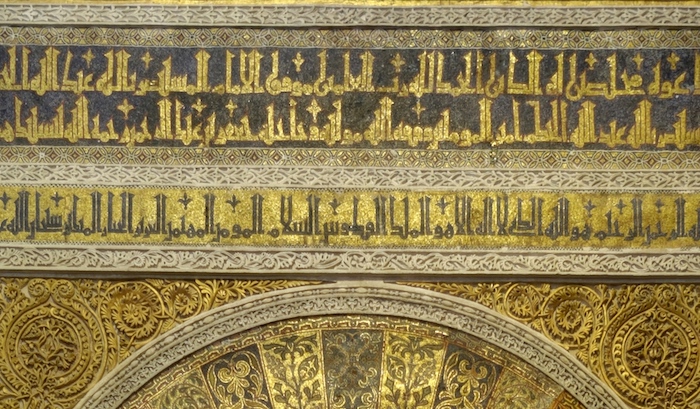
In 60 A.H. (679-680 A.D.) the first caliph of the Umayyad dynasty, Mu’awiya I, appointed a man named Amr to lead a raiding campaign. Amr did so, but was unhappy with the way Mu’awiya was spending government funds. This was a recurring problem. I’ve previously written about similar concerns under the reign of Caliph Uthman. Uthman was a member of the previous dynasty, but was from the same family as Mu’awiya (the Umayyads) and a reputation for corruption has dogged the Umayyads ever since. Heck, after I published that earlier piece, I received an anonymous email in Arabic assuring me that “the Umayyads still trade power among themselves to this day.”
According to Khalifa, when Amr returned to court, Mu’awiya asked him for the khums: the one-fifth part of the plunder that should be set aside for the state. Amr turned it around. He pointed at an old man and said (paraphrasing here), “Hey, I know that guy! He was one of the earliest Muslims, a companion of Muhammad who fled with him from Mecca to Medina. He’s a man of great honor and prestige. But he’s on foot. Shouldn’t I use part of the khums to buy him a horse?” Mu’awiya forbade it, and Amr refused to hand over the khums and added some poetry:
The rulers in Damascus are given my plunder
While I abandon my friends. That is unjust.
I am not a leader who accumulates money like a merchant
And I do not seek a long, miserly tenure
If the ruler of Damascus withholds his wealth, fine
But I do not wish to lock up my part of it
Khalifa does not record Mu’awiya’s response to Amr’s impertinence.
At your table, what you’ve got is an NPC (Amr) who owes money to another NPC (Mu’awiya) but won’t pay it. The former feels the latter is unjust and refuses to give him money with which he can perpetrate further injustice. Both NPCs might appeal to the party intercede on their behalf, maybe because the PCs are powerful, influential, have a reputation for justice, or are some cold-blooded mercenaries who can make the problem ‘go away’. The PCs will have to figure out which side they’re on, try to convince the other side to let it go, and maybe apply leverage if nice words don’t work.
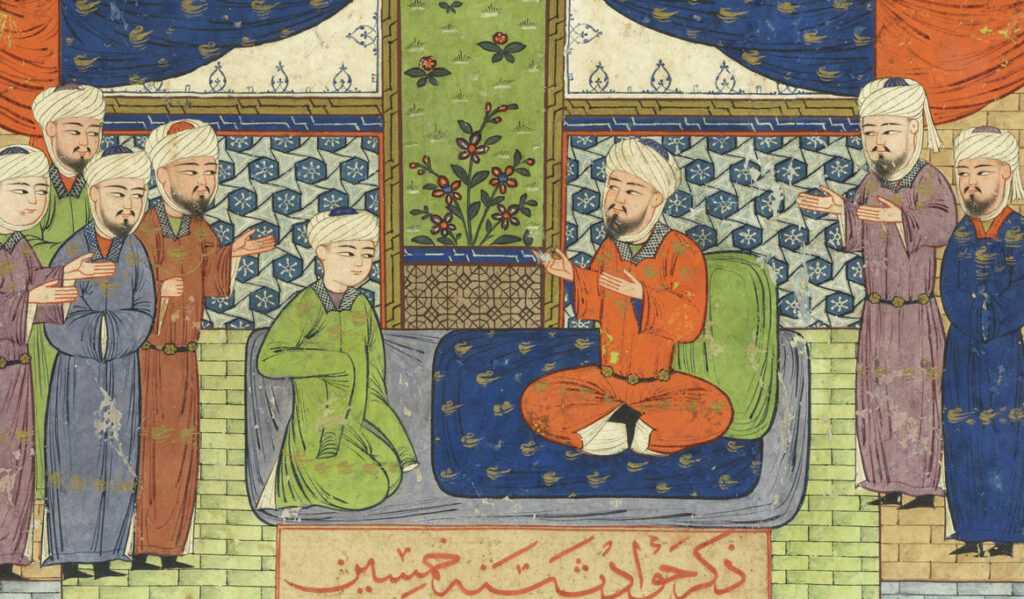
In 82 A.H. (701-702 A.D.), the governor of Iraq, a man named al-Hajjaj, faced a large and popular revolt led by an Iraqi aristocrat. Al-Hajjaj was seen as an outsider. The troops with which he maintained order were mostly Syrian. And while al-Hajjaj was a competent and able administrator, he was also unhesitatingly ruthless. This harshness may be the reason he was picked to govern restive Iraq. One of al-Hajjaj’s councillors, Imran, defected to join the rebellion. Khalifa has someone remember a poem Imran once recited about al-Hajjaj, which should have been a warning of Imran’s true loyalties:
You sent from the children of the noble Mu’attib [an ancestor of al-Hajjaj]
A falcon whose dove takes refuge in the thorn tree
If you cook in his fire, we will all be cooked
If you cook in another fire, we will be well
He is a lion. If he wants to seize an animal as prey
Loud screaming will not rescue it from him
Al-Hajjaj’s forces eventually captured Imran and brought him before the governor. Al-Hajjaj had Imran beheaded. As promised, loud screaming did not rescue him. Al-Hajjaj oversaw the infamously bloody destruction of the popular revolt and proceeded to govern a pacified Iraq competently and well.
At your table, Imran’s poem is a warning of two things: Imran’s loyalty and al-Hajjaj’s character! Imran aptly compares al-Hajjaj to a falcon and a lion: animals associated with nobility and violence. What do your PCs do with such a warning? Do they report your NPC analogue of Imran to your version of al-Hajjaj for suspected treason? Do they take the warning to heart and try to depose your al-Hajjaj-analogue before he can do much damage? Or do they quietly try to bring Imran around to the view that al-Hajjaj’s virtues outweigh his flaws?
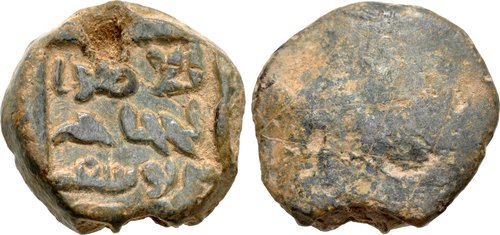
Image credit: Classical Numismatic Group, Inc. http://www.cngcoins.com released under a CC BY-SA 2.5 license.
In 102 A.H. (720-721 A.D.), a family called the Muhallabids rose up in revolt against the caliphate. Umayyad forces slew the Muhallabid leader in battle, routed their forces, and captured many Muhallabid soldiers, women, and children. These they brought to Damascus to the court of Caliph Yazid II. When the prisoners entered the court, it seemed likely they would be executed – even though many were noncombatants. A famous poet named Kuthayyir ‘Azzah rose to plead for the prisoners’ lives. The Muhallabids had previously been Kuthayyir’s patrons, and Kuthayyir argued that if Yazid spared the prisoners, the Muhallabids would be driven out and the revolt would disappear on its own:
A man of forbearance, whenever he can, either punishes
Most severely or forgives without a harsh reprimand.
Forgiveness, Commander of the Faithful! Divine reckoning!
Whatever good you do will reap a divine reward.
They did great evil. If you are able to forgive –
And the greatest forbearance that can be imagined
Is the forbearance of an angry man –
The nobles will drive them from the valleys of Mecca
As will Yemenis with their striped swords
Yazid II rejected Kuthayyir’s argument. He said the poet was swayed by the Muhallabids’ former patronage. Yazid II invited anyone with a blood debt against the rebels to come and claim a prisoner. 200 Muhallabids were executed in this fashion. Nonetheless, the family survived and became quite influential in later centuries.
At your table, you don’t need a rebellion to use this poem. All you need is someone passing judgement over someone who’s wronged them – or better yet, passing judgement over someone related to the wrongdoer, the real culprit being dead or unavailable. The PCs can join in to help plead for mercy. If that doesn’t work, they can manufacture a claim to having been wronged so they can execute the defendant, but actually set them free. If the PCs are on the anti-mercy side, they can argue against the poet and try to sniff out manufactured claims. I’d like to think few players would be on the anti-mercy side, though.
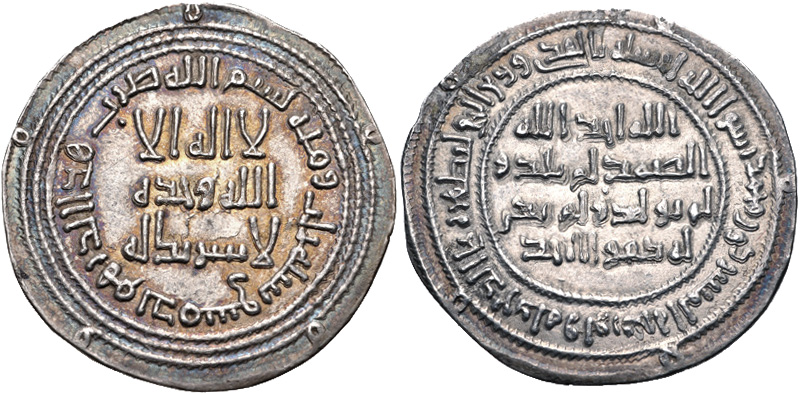
Image credit: Classical Numismatic Group, Inc. http://www.cngcoins.com released under a CC BY-SA 2.5 license.
In 128 A.H. (745-746 A.D.), Caliph Marwan II put down a Kharijite rebellion in Iraq. The Kharijites were a peculiar sect of Islam that no longer exists. It stood alongside Sunni and Shia Islam and was arguably more important than the latter for the first two centuries of the religion. Kharijites believed that only God could pass judgement over people. At the time, Islam was riven with factionalism and civil wars, which the Kharijites interpreted as different sides casting judgement on one another. Therefore, anyone who was part of a faction (e.g. any Muslim who wasn’t a Kharijite) was not a Muslim at all but a heretic and needed to be purged. “But Tristan,” you say, “Doesn’t that make the Kharijites a faction that casts judgement on people?” Of course it does, but most of our surviving sources from this era are distinctly anti-Kharijite. The Kharijites lost big, and we can’t entirely trust their enemies to faithfully record their beliefs and grievances. So while my description of the Kharijites is fairly orthodox, it also needs to be taken with a grain of salt.
Khalifa puts the following poem in the mouth of a Kharijite widow who lost in this year’s rebellion her father, brother, husband, mother, and paternal and maternal aunts:
Who is there to give comfort to a heart wracked by sadness
Or to a soul that has no peace?
The pious ones have departed and gone away
The best family there is has gone
A family that is dead
Whatever they did was good
They faced the swords in battle
Unflinchingly and were no cowards
Kharijites who sold themselves to God
And by Him were not defrauded
They pursued the pleasure of their Lord
When religion and law had died
These people attained what they sought:
God’s blessings unprecedented
There weren’t many Kharijite rebellions after this one. The hardliners were crushed, their religion exterminated. From the Kharijites, though, grew a new sect: Ibadi Islam. Today it is the third major sect of the religion (though a distant third) and the dominant religion in Oman. Ibadis are not Kharijites and – given the latter’s (perhaps unfair) reputation as blood-mad zealots – Ibadis don’t much appreciate being compared to them. But they are theological descendants of much more moderate Kharijites. Perhaps the grieving widow above might take some comfort in that.
At your table, you again do not need a giant, full-scale rebellion to use this poem. All you need is a dissident group, some of whose members were killed by the state. That same state might ask the PCs to monitor this widow. She’s so public in her support for the dissidents that whoever contacts her is probably someone worth surveilling. The PCs will have to choose. Do they mistrust the dissidents enough to go along with the state? Do they find the situation distasteful enough to walk away and earn the state’s ire? Or do they side with the widow and forge ties with her people?
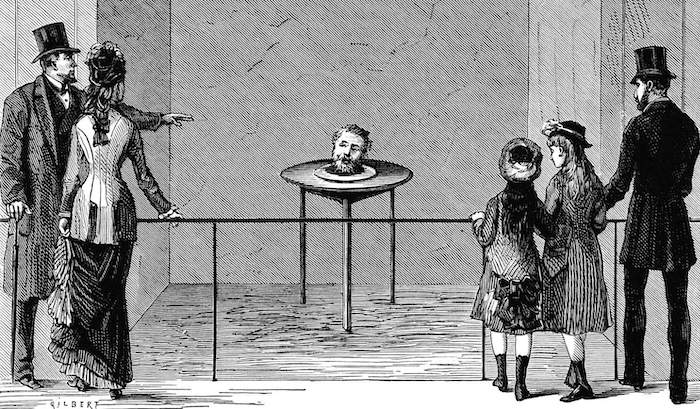
Come follow and chat with me on social media! On Twitter, I’m @moltensulfur. On Facebook, I’m Molten Sulfur Press.
Source: Khalifa ibn Khayyat’s History on the Umayyad Dynasty (660-750), translated by Carl Wurtzel (2015)






